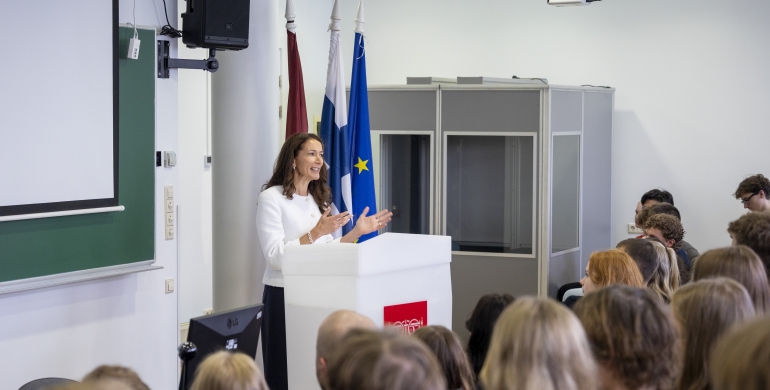On September 16, 2025 Riga Graduate School of Law (RGSL) had the distinct honour of hosting Suzanne Innes-Stubb for a guest lecture titled “Compliance in a Global Company” delivered exclusively to RGSL students as part of the official visit of the President of Finland Alexander Stubb to Latvia.
Mrs. Innes-Stubb, a seasoned international lawyer and the spouse of the President of Finland, brought a unique perspective, stating: “Today I wear two hats – as a spouse of the president and as a lecturer.”
Drawing on a distinguished legal career spanning the UK, Belgium, and Finland, with over a decade of experience in corporate ethics and compliance, she provided timely and practical insights to future legal and business professionals.
Her lecture emphasised that compliance is no longer optional in today’s interconnected global economy, reports RGSL 3Y Law&Diplomacy student Eva Šlēziņa.
“Whether it's environmental regulation, anti-bribery, human rights, or cybersecurity, compliance shapes the future of every international company,” said Mrs. Innes-Stubb. She shared real-world case studies from companies such as Volkswagen, Google, Siemens, and Nokia, demonstrating the heavy financial, legal, and reputational consequences of compliance failures.
Students were challenged to envision themselves not in a classroom, but in the boardroom of a multinational corporation. “Imagine sitting in an executive meeting. News breaks of a fraud scandal or a harassment case – who is responsible?” she asked. Her message was clear: misconduct can arise from anyone, and often stems from ethical blindness, personal rationalisation, or toxic company culture.
The lecture highlighted the growing regulatory demands from the EU, including directives such as the CSRD and CRDD, which require companies to uphold human rights, prevent modern slavery, and maintain transparent supply chains. “Ethics is not a luxury; it’s a legal and moral imperative,” she stressed.
Mrs Suzanne Innes-Stubb underscored the importance of leadership and culture in shaping corporate behaviour. “A company’s ethical climate is built by its leaders. When bullying or fear dominate, integrity suffers,” she warned, advocating for empowered leadership and safe channels for whistleblowers.
As a closing thought, she left students with a powerful reminder:
“Business success depends not only on what you achieve but on how you achieve it.”
Thank you to Mrs Innes-Stubb for a very exciting lecture and the Chancery of the President of Latvia for arranging this opportunity.

